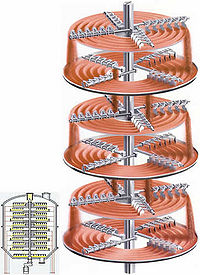Difference between revisions of "Plate Dryers"
(Created page with "Category:Drying{{Knoppen}} <noinclude><!------------------------------------------------ * READ THIS FIRST * Only edit this page if you can improve the content. * Improp...") |
PurplePen19 (talk | contribs) |
||
| Line 7: | Line 7: | ||
* Please start editing this page after the /noinclude | * Please start editing this page after the /noinclude | ||
* -------------------------------------------------></noinclude> | * -------------------------------------------------></noinclude> | ||
[[File:Plate Dryers.jpg|thumb|200px|right|Plate Dryers]] | |||
'''Plate Dryers''' are widely used in the chemical industry and can vary accordingly to the type of fuel. The process of plate drying is very much similar with the [[Belt Dryers]] wherein a distribution conveyor provides the even distribution of material over the entire surface. The plate-belt consists of plates made of perforated, powder coated tin or stainless steel. By turning down the plates at the belts end, the drying material is shifted to the lower level. Thus the belts surface is used in both directions of travel, which has for the advantage that the footprint of the dryer is comparatively small. The dryer is modular designed. Between the racks for the drive gears and guide rollers more or less belt elements are installed. The processing of the drying air is done by an exhaust air fan. Optionally this can be equipped with variable frequency drive. A dust filter for the exhaust air or biofilter can be connected at the outlet side, if necessary. | |||
Revision as of 20:37, 19 August 2012
Plate Dryers are widely used in the chemical industry and can vary accordingly to the type of fuel. The process of plate drying is very much similar with the Belt Dryers wherein a distribution conveyor provides the even distribution of material over the entire surface. The plate-belt consists of plates made of perforated, powder coated tin or stainless steel. By turning down the plates at the belts end, the drying material is shifted to the lower level. Thus the belts surface is used in both directions of travel, which has for the advantage that the footprint of the dryer is comparatively small. The dryer is modular designed. Between the racks for the drive gears and guide rollers more or less belt elements are installed. The processing of the drying air is done by an exhaust air fan. Optionally this can be equipped with variable frequency drive. A dust filter for the exhaust air or biofilter can be connected at the outlet side, if necessary.
